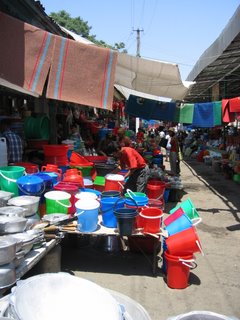
June 21, 2006
I’m back in Osh, where I find the most welcoming sound to be the call of the muezzin. It rang out so clearly in the early evening that I could hear the timbre of the singer’s voice. It sounded as though he were calling from a neighborhood rooftop. Now, again, in the evening, as I prepare for bed, I hear the call again, marking the phases of the day, allowing residents to set their life to a rhythm.
I flew down in a Yak-40, with an airline I try to avoid. Usually I travel on Altyn Air and while the planes are small, I’m generally not focused on the plane’s ability to stay in flight during the journey. But on this little thing, which passengers entered by crawling into the plane’s belly, I constantly worried about the plane’s capacity to stay above the mountain peaks. I tried to distract myself by listening to my ipod. But when we suddenly dropped and began to shudder from side to side, I paused the ipod and reached out for the seat in front of me.
Our driver, Malan, met me at the airport. He was thrilled to have received a 60 percent raise recently and was in very good humor. He’d been thinking of going to Russia to work, though his wife hadn’t wanted to let him go.
“My wife is very content now that I’m not going anywhere,” he said. “And my son is very happy as well. When he heard that I might go to Russia, tears welled in his eyes.”
As we entered town, we saw a giant truck with standing men packed into the open-air back, many of them wearing Uzbek caps. They looked stoically at the road ahead.
“What’s that?” I asked Malan.
“They are going to the cemetery to bury someone. The casket is lying on the floor, among them.”
He told me that Muslims use caskets only to take someone to the cemetery. They don’t bury people in boxes.
“When a man gets old and is preparing to die, he’s supposed to buy a nice white material, that will be used to wrap his body. And the money used to buy that material should come only from honest, hard work. One shouldn’t use money that they got by deceitful means.”
I’ve never paid much attention to cemeteries in the south. They somehow remain much more inconspicuous than northern cemeteries.
“In Kazakhstan and in northern Kyrgyzstan, people build memorials from brick, they make them almost like homes,” Shavkat told me. “In the south, we basically just put people in the ground, maybe with a headstone.”
I came home to Nigora and Shavkat’s. We spent the evening looking at the photos of Nigora’s Issyk-Kul journey I’d brought them on a disk and eating their second-to-last duck, which they’d killed for my arrival.
The boys are all finished with exams and trying to figure out what to do for the summer. Habib got a job as the administrator of an internet club, until he showed up late the first two days and the owner gave the job away to a girl.
“I was tired after my exams and wanted to rest before going right to work,” he explained.
Nigora is continuing her work selling dishes at the market, and Shavkat is preparing for the tourists he expects in the coming month or two.
I’m back in my old room, that I lived in for ten months. The two beds that made up the double bed have been separated and I’ll be sleeping at an angle perpendicular to how I always slept before. I look up at the top of the wardrobe, where my stacks of books gathered dust, at the deep windowsill, emptied of my scattered belongings, at the stovetop, where my TV once stood.
I lived in a significant portion of my life in this room in Osh, Kyrgyzstan, but all the signs of me have been erased. It’s as though I’m sneaking in as a ghost, to see how I may have lived in a former life.
Outside on the patio, I can hear Nigora describing the photos to Shavkat and Faruh, as they appear on the computer screen. For once, she’s the source of knowledge and the adventurer. She’s seen something none of them have. And a quiet pride fills her voice as to listens to and responds to her family’s interest.



No comments:
Post a Comment